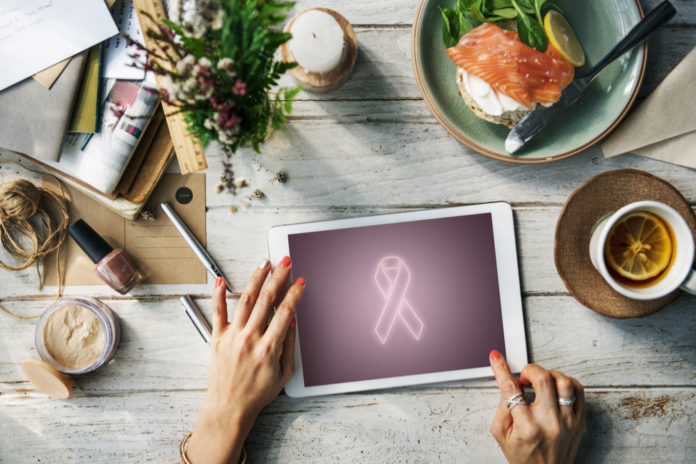According to breastcancer.org, approximately 12 percent of U.S. women will develop invasive breast cancer over the course of her lifetime. And while there are an estimated 252,710 new cases of invasive breast cancer expected to be diagnosed in women in 2017, we must not discount the male population. In fact, about 2,470 new cases of invasive breast cancer are expected to be diagnosed in men in 2017, with a man’s lifetime risk of breast cancer is about 1 in 1,000.
Diet for Breast Cancer
While there may not necessarily be foods that fight breast cancer, research leans towards a more plant-based, low-fat diet to lower cancer risk and progression. Additionally, evidence supports following a Mediterranean-inspired diet may also reduce breast cancer risk. In addition to the valuable nutrients these diets supply, they can further combat against obesity, a significant risk factor for cancer development. The following dietary recommendations can keep you as healthy as possible:
Go for Colorful Produce
Colorful fruits and veggies are one of the most natural ways to optimize health. Aim to consume at least five cups per day, further divided into three veggies and two fruits. To ensure their consumption, swap juice for a whole piece of fruit, blend handfuls of spinach into smoothies, and throw broccoli, zucchini, and onion into soups or eggs.
Include High-Fiber Foods
Besides fresh fruits and vegetables, add more whole grain breads and cereals and legumes to increase fiber in your diet. Though the warrant is still out, mild evidence suggests high-fiber diets can protect against cancer.
Choose Healthy Fats
As mentioned, a low-fat diet may protect against breast cancer. However, the body does need some fat to carryout normal physiological processes. But all fats are created the same and health experts encourage the intake of some over others. Avoid trans fats altogether and limit saturated fats to less than six percent of total calories per day, including moderating and reducing processed meats, high-fat snacks, desserts, salad dressings, and any fried foods. Choose healthy fats such as monounsaturated (MUFAs) and omega-3 fatty acids, as they have shown to offer anti-inflammatory properties and potentially protect against cancer. Healthy fat sources include nuts and seeds, fatty fish, avocadoes, and olive and canola oils.
Select Low-Fat Dairy
Although choosing healthy fats is encouraged, moderating fat intake continues to take precedency when it comes to lowering breast cancer risk. Health experts suggest low-fat dairy products fortified with vitamin D may actually safeguard against breast cancer. In fact, research proposes women with low vitamin D levels have a greater risk of breast cancer.
Consider Soy
Though once scrutinized for its rumored link to breast cancer, moderated amounts of soy have shown to be safe, even showing to reduce cancer risk in Asian populations. The Susan G. Komen Breast Cancer Foundation goes on to say “Current evidence suggests that a diet high in soy may improve survival and lower the risk of recurrence in women with breast cancer.” Rather than processed products, most nutrition experts encourage the consumption of whole and raw forms of soy, including edamame, soy nuts, tempeh, and tofu.
Snack Sensibly
While snacking is often discouraged when trying to lose weight, the practice can actually be highly beneficial to health and reduce weight gain risk. But there is a caveat… Snacks should be treated as snacks, not meals, and offer some sort of nutritional value. So snack sensibly on moderated portions, dismiss highly processed chips and other innutritious snack foods, and relish on these 20 easy and simple healthy ideas.
Limit Added Sugar
Though the link between breast cancer risk and sugar intake still deserves attention, too much of the sweet stuff can nonetheless contribute to weight gain. The American Heart Association (AHA) encourages limiting added sugar intake to no more than 38 and 25 grams of sugar per day for men and women, respectively. In addition to reducing the more obvious sources of sugar such as cookies and snack cakes, be weary of hidden sources, including canned fruits and vegetables, yogurts, salad dressings, and granola bars. You can also limit added sugar intake by becoming more comfortable identifying sugar on the Nutrition Facts and Ingredient labels.
Though consuming a healthy diet is highly beneficial, it should not replace other preventative and proactive measures for lowering breast cancer risk. Similar to all aspects of health, there are numerous factors that impact disease risk, including cancer. Data published in Europe PMC further addresses and stresses the importance of maintaining a healthy weight, limiting alcohol consumption, and partaking in moderate intensity exercise. In fact, the National Cancer Institute suggests women who exercise four or more hours a week have a lower risk of breast cancer. While cancer screenings are supported throughout the lifespan, exams among childhood, adolescent, and early adulthood when the breasts are rapidly developing and susceptible is emphasized.






